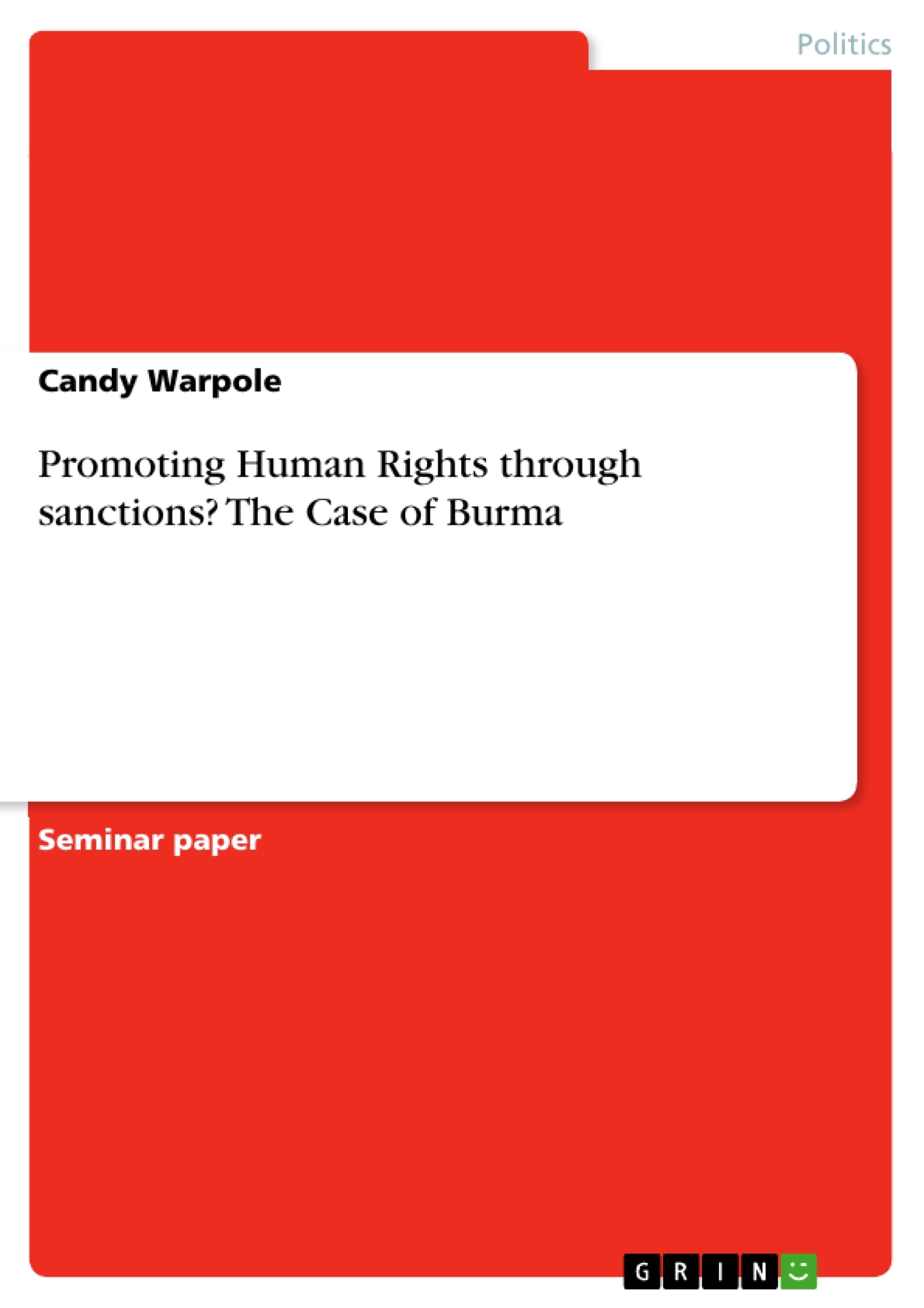Since the end of the Cold War a new option in the decision on how to respond to threats to state security and freedom has gained popularity in foreign policy: economic sanctions. This middle course between military intervention and inaction has assumed an increasingly prominent role in many countries. The United States used sanctions against Haiti, Yugoslavia, Lybia and Iraq; the list of countries on which UN sanctions have been imposed includes embargoes against Al Quaeda, Iran, Liberia, North Korea and several more. With the emergence of an increasing demand for human rights by governments and institutions, sanctions have become a popular instrument to underscore and pressure for human rights claims.
Inhaltsverzeichnis (Table of Contents)
- Introduction
- Human rights as a subject of foreign policy
- From a domestic to an international issue
- The universalism of human rights
- Enhancing a self-image and domestic factors
- Summary
- Economic sanctions as foreign policy instruments
- Modes of sanctions -a definition
- Purpose of sanctions
- What factors make sanctions succeed or fail?
- The use of sanctions to expedite human rights
- The case of Burma
- The human rights situation in Burma
- Burma policies -between sanctions and aid
- What has Western sanctions policy accomplished so far?
- Possible explanations for its failure
- Alternative approaches
- Conclusion
Zielsetzung und Themenschwerpunkte (Objectives and Key Themes)
The main objective of this paper is to explore the effectiveness of economic sanctions in promoting human rights, using the case of Burma. The paper argues that sanctions are a limited tool in achieving human rights improvements and are not necessarily an effective strategy for promoting democracy and human rights in Burma. The key themes explored are:- The role of human rights in foreign policy
- The effectiveness of economic sanctions as a foreign policy instrument
- The human rights situation in Burma
- The impact of Western sanctions on Burma
- Alternative approaches to improving the human rights situation in Burma
Zusammenfassung der Kapitel (Chapter Summaries)
- The introductory chapter examines the growing use of economic sanctions as a foreign policy tool in the post-Cold War era. It highlights the increasing demand for human rights and how sanctions have become a popular instrument to enforce these claims. The chapter then specifically focuses on the case of Burma, where economic sanctions have been in place for over 20 years, and raises the question of their effectiveness.
- The second chapter examines the role of human rights in foreign policy. It explores how human rights have evolved from a domestic concern to an international issue, with the adoption of the Universal Declaration of Human Rights in 1948 playing a pivotal role. The chapter further discusses the concept of universal human rights, the motivations of Western states and institutions in promoting them, and the role of both national and international factors in shaping state policy.
- Chapter three focuses on economic sanctions as foreign policy instruments. It defines economic sanctions as deliberate government-inspired withdrawal of trade and financial relations and explores the various forms they can take, including trade restrictions, embargoes, and financial sanctions. The chapter discusses the goals and potential of sanctions, as well as factors that contribute to their success or failure.
- The fourth chapter applies the theory of sanctions to the specific case of Burma. It outlines the human rights situation in Burma, explores the impact of Western sanctions policies, and examines potential explanations for their perceived failure. The chapter concludes by exploring alternative approaches to promoting human rights in Burma.
Schlüsselwörter (Keywords)
The main keywords and focus topics of this paper include economic sanctions, human rights, foreign policy, Burma, democracy, international relations, universalism, and alternative approaches to promoting human rights. The text also explores the motives behind state actions in promoting human rights, the effectiveness of different foreign policy instruments, and the challenges of achieving positive change in countries with a poor human rights record.Frequently Asked Questions
Can economic sanctions effectively promote human rights?
The effectiveness of sanctions is limited. While they pressure regimes, they often fail to achieve democracy and can have negative humanitarian impacts on the general population.
What are the different types of economic sanctions?
Sanctions include trade restrictions, total embargoes, financial sanctions (freezing assets), and the withdrawal of foreign aid.
Why were sanctions imposed on Burma (Myanmar)?
Western nations imposed sanctions due to severe human rights violations, the suppression of democratic movements, and the military regime's refusal to recognize election results.
What factors contribute to the failure of sanctions?
Failure can be caused by lack of international cooperation (sanctions busting), the regime's ability to adapt, and the fact that sanctions might strengthen the regime's grip on internal resources.
Are there alternative approaches to sanctions?
Alternatives include "constructive engagement," targeted aid, diplomatic pressure, and promoting internal dialogue through non-governmental organizations.
How did the Universal Declaration of Human Rights influence foreign policy?
Since 1948, human rights have evolved from a domestic matter to an international issue, allowing states to justify intervention or sanctions based on universal moral claims.
- Quote paper
- Candy Warpole (Author), 2010, Promoting Human Rights through sanctions? The Case of Burma, Munich, GRIN Verlag, https://www.grin.com/document/211960



